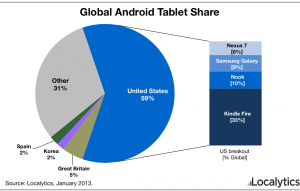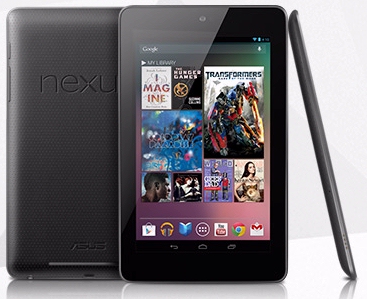
Who’s winning the tablet wars? Forbes magazine uncovered some interesting statistics. If you buy a tablet, and it’s not an iPad, chances are it’s running the Android operating system. And Amazon has apparently sold one-third of all the Android tablets in the world!
But wait, there’s an even more impressive statistic. The Kindle Fire isn’t available in every country. In fact, 89% of all Kindle Fire tablets are in either the United States or England, according to the statistics from a company called Localyties, which notes that the Kindle Fire currently isn’t even available in Canada. But if you look at the United States, where the Kindle Fire has always been available, Amazon has already sold more than half of all the Android tablets currently in use. There’s lots of competition, including Google’s Nexus 7 and Samsung’s Galaxy S, but in America the Kindle Fire has already claimed 56% of the market for Android tablets!
“Their US success suggests they could quickly dominate the Android tablet market worldwide,” reports Localytics — assuming Amazon can come up with the right kind of distribution — and they add that Amazon seems poised to bring their success in the U.S. to the rest of the world. “[A]t an event launching the Kindle Paperwhite to Canada, Amazon’s VP in charge of the Kindle noted that they are working hard to launch the Fire lineup worldwide.” Localytics gathered information from more than half a billion devices, so they’re working with a pretty good snapshot of the “universe” of tablet devices today.
By comparison, the Nook from Barnes and Noble seems to have just 16% of the U.S. market — and just 10% of the market around the world. And the figures from Localytics also show that the market share is even smaller for Amazon’s other competitors in the Android tablet market. The Samsung Galaxy accounts for just 15% of the U.S. market, and 9% of the world market for Android tablets — and the Nexus 7’s U.S. market share is just 13.5%, with an 8% share around the globe.
Interestingly, Localytics also found that 59% of the Android tablets in the world were located in the United States, so it’s a great place for Amazon to launch its global conquest of the tablet market. (“Kindle Fire Dominates US Android Market,” wrote Forbes in their headline, “but Seemingly Non-existent Outside the US.”) At the bottom of the article, their reporter offers a disclaimer that his family actually owns shares of Apple’s stock, but he still seems pretty bullish on Amazon.
“When the Kindle Fires become available in more countries they could take a significant amount of market share in the international Android market,” he writes, “and put some pressure on Apple’s iPad!”
